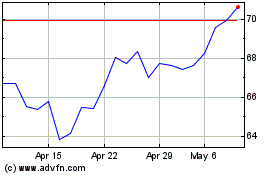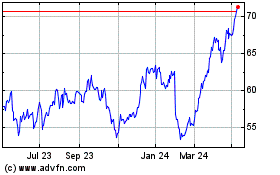What GM Is Paying for European Exit--Heard on the Street
March 06 2017 - 8:24AM
Dow Jones News
By Stephen Wilmot
General Motors is so eager to offload its loss-making European
arm that it is paying Peugeot to buy it.
The French car manufacturer has agreed to give GM EUR1.32
billion for Opel, a historic German brand, and Vauxhall, a British
one.
This lowly valuation equates to 7.4% of sales, compared with 12%
on average for European mass-market car makers, according to UBS.
Only about half of the purchase price will be in cash. The rest
will take the form of warrants that give GM the right to buy and
immediately sell new Peugeot shares in between five and nine years'
time.
Peugeot and French bank BNP Paribas are also jointly paying
EUR0.9 billion in cash for Opel-Vauxhall's financing arm. That
brings the value of the deal to GM up to about EUR2.2 billion in
total.
On the debit side, however, GM is giving Peugeot EUR3 billion to
shoulder some of its European pension obligations, including those
concerning active workers in Germany. GM is also retaining a
European pension deficit currently valued at about EUR6.5 billion
on its balance sheet.
On a net basis, GM is therefore paying EUR0.8 billion--and more
if Peugeot's share price falls--to not quite rid itself of its
European problems. This may be the cash part of the $4 billion to
$4.5 billion write-down the U.S. auto maker announced in connection
with the deal Monday. Chief Executive Mary Barra instead emphasized
a $2 billion reduction in the company's "cash-balance requirement
under its capital-allocation framework." The spare cash could be
used to buy back shares, Ms. Barra said.
Peugeot shares jumped on news of the financial details. The car
maker has bought a big increase in European market share on the
cheap. Whether shareholders, including GM indirectly through its
warrants, continue to benefit depends mainly on Peugeot's capacity
to achieve cost savings. These are estimated at EUR1.7 billion,
which would easily justify the paltry sum the company has paid, but
are expected over an unusually long period of a decade. About
two-thirds of the savings should materialize by 2020, however.
Under pressure from politicians across the Continent, Peugeot's
Portuguese Chief Executive Carlos Tavares has carefully avoided
talk of staff cuts or factory closures. Only a fifth of the
targeted savings are supposed to come from the manufacturing
operation, which is perhaps most politically sensitive. The rest
will be sought by sharing purchasing, research, sales and capital
spending.
Mr. Tavares has been credited with working miracles on Peugeot's
cost base, but the company's capacity utilization has also
benefited from a buoyant market backdrop, particularly in its key
French market. With limited scope to cut factory capacity, profits
at Peugeot-Opel will be even more dependent on the health of the
European market than Peugeot's currently are.
The risks in this deal are substantial, but at least Peugeot
isn't paying much to take them.
Write to Stephen Wilmot at stephen.wilmot@wsj.com
(END) Dow Jones Newswires
March 06, 2017 09:09 ET (14:09 GMT)
Copyright (c) 2017 Dow Jones & Company, Inc.
BNP Paribas (EU:BNP)
Historical Stock Chart
From Mar 2024 to Apr 2024

BNP Paribas (EU:BNP)
Historical Stock Chart
From Apr 2023 to Apr 2024
